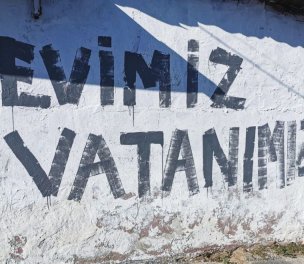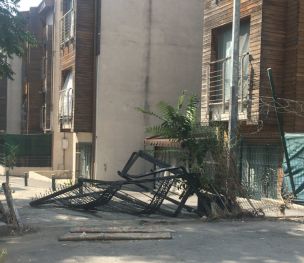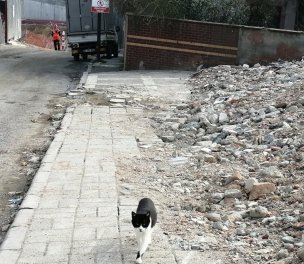Photos: Zülal Koçer, Video: Gözde Batmaz
Click to read the article in Turkish
In the early 2000s, Türkiye's cities, especially its metropolises, started to become familiar with urban transformation projects.
Controversial since their implementation, these large projects are officially intended to demolish old buildings for risk and earthquake management or the city's restructuring. These projects promise the provision of better accommodation conditions to their residents.
However, according to many inhabitants of these projects, it actually destroys their neighborhoods, and urban transformation is referred to as "rental transformation."
The issues with these projects have not changed for many residents in these assigned transformation areas. Moreover, they have worsened due to the current economic crisis and high rent increases. Rent prices have more than doubled in some areas in a year across Türkiye. Especially larger cities see a significant increase in rent prices.
A "worse end" awaits the new victims in the grip of never-changing intimidation policies and the economic crisis.
To see this, it is enough to take a look at three neighborhoods of İstanbul that are in the urban transformation process: Tozkoparan in the Güngören district, Fetihtepe in Okmeydanı and Tokatköy in the Beykoz district.
Tozkoparan
Tozkoparan and the adjacent Mehmet Nesih Özmen district, also known as the Cuba of İstanbul because of their working-class background, were allocated as "urban transformation areas" in 2006 and "risky areas" in 2013.
Residents continue to resist the urban transformation projects even when a Presidential Decree marked the region as a "disaster area" on April 21, 2020. Inhabitants of the working-class neighborhood say that it was declared a "risky zone" because of its vicinity to a commercial center.
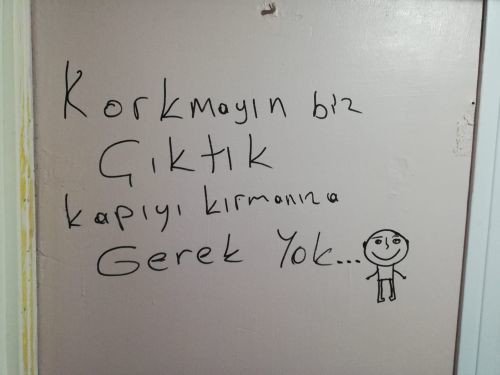 "No worries, we are out. You don't need to break the door."
"No worries, we are out. You don't need to break the door."
However, demolition continues in Tozkoparan. 84 buildings housing 900 households waiting to be demolished. Electricity and water cuts have pressured the residents out of their homes for two and a half years. On October 8, the police forcibly evicted people from their homes and construction machines entered the area early in the morning.
Besides these pressures, people who do not leave their homes are detained. The residents of the neighborhood state that the demolitions are not legal. Many are not against the urban transformation but against the rent-based change, as the rents around Tozkoparan are increasing. The 'working-class neighborhood' houses many people whose economic conditions are below the poverty line. Therefore, they demand a place of shelter after their houses are demolished.
Fetihtepe
In Fetihtepe, located in Okmeydanı on the European side of İstanbul, destruction and construction are already well on their way. Okmeydanı was declared a risky area on June 2, 2014, based on the controversial disaster law 6306. Introduced in 2012, the law allows the government to tear down every house it deems 'risky'.However, the municipality's 'risk area ruling' was contested at the time, as no scientific reports were shown indicating an earthquake risk.
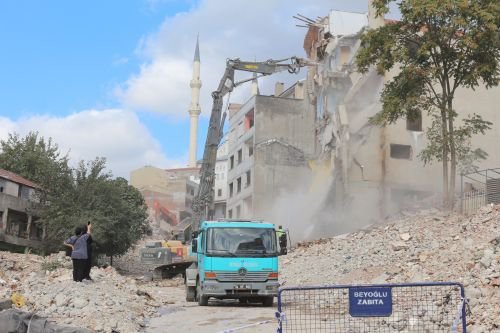
Okmeydanı has seen large migrant waves since the 1950s when the area was an empty plot of land filled with mulberry fields. Over time, the municipality provided Okmeydanı with water, electricity, and other infrastructure services and started collecting taxes. Before elections, politicians would promise residents title deeds in exchange for votes.
During informal areas' formalization efforts, residents began preparing their files in 1983. They acquired deed allocation documents, which would later turn into deeds, by paying Ziraat Bank 2,000 lira. In the 30 years that passed, residents did not receive their deeds. Immigration into the neighborhood continued, as numerous people from the eastern and southeastern regions settled in the neighborhood, especially following 1990, due to "mandatory immigration."
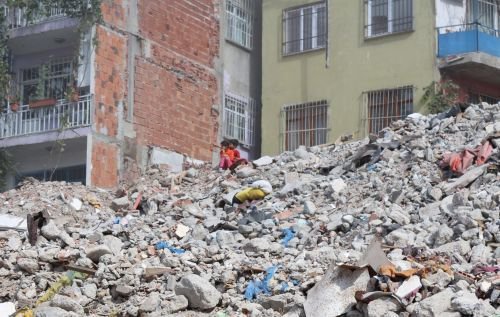
During the current urban transformation project, 937 houses in Fetihtepe are intended to be reconstructed. The construction in this area causes immense dust clouds and heavy tremors to damage other buildings in the area. Many residents whose houses are in the rubble have left the city or the neighborhood. Despite people with title deeds receiving rent support between 1.300lira and 1.950Tl, many move away from Okmeydanı, a central district, to more remote areas with cheaper rent.
.jpg)
"Rental transformation"
Mustafa Çelik is one of the few people who still live in the Fetihtepe, although the house where he was born and grew up was destroyed. He explains that they were under tremendous pressure to evacuate their homes before the demolition and that they were persecuted after the destruction.
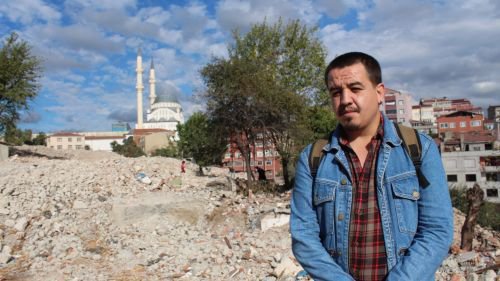
"It is not an urban transformation but rental transformation," Çelik remarks. He blames the government for what happened—expressing that the claims that the demolition was based on consent do not reflect the truth. Çelik stated that he was "a member of AKP for 20 years", but is angry at the government. He noted that the tender for the urban transformation project was given to Kuzu Group, a company affiliated with the government. Çelik remarked with a Turkish expression that even when they resist, they continue to exploit people.
"There was no asbestos control"
Hasan Karayiğit from the "Okmeydanı Right to Housing Struggle" has lived in the area for 32 years. He has been in solidarity with the people of the neighborhood since the beginning of the ordeal.
"The neighborhood has been destroyed in 4 months. The reason is rental transformation. Because this is a neighborhood where the poor reside, they want to drive the poor out of these city centers and bring in the rich. Also, this neighborhood is very close to the Golden Horn. They want to change the areas of the Golden Horn and Okmeydanı with their Haliçport and Galataport projects."
.jpg)
Urban transformation projects are mostly given to capital groups close to the government, according to Karayiğit, and remarks that poor people are indebted with unpayable amounts. He expresses that they do not believe that the project will be completed in the promised 18 months.
Although their objections are not to urban transformation, Karayiğit says, "Everyone here wants the buildings to be renewed. We want an on-the-spot transformation, yes, but people should not be charged millions of lira."
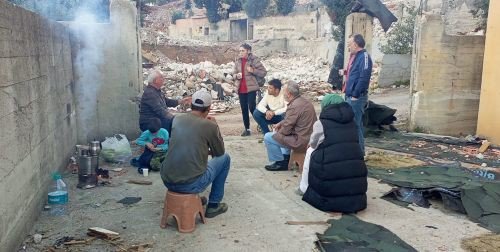
"They should not demolish a 100-square-meter house and give them a 60-square-meter house," he demands.
Karayiğit stated that no safety and environmental precautions were taken when the demolition started, "After we brought this issue up, they brought a water tanker for show. Before the demolition, there was no asbestos control, we breathe this dust everywhere."
Tokatköy
In the Tokatköy District of Beykoz, İstanbul, the AKP's Beykoz Municipality is forcibly evicting its citizens from their homes. For instance, on September 1, 2022, police entered the Tokatköy District in the early morning. The police broke down the doors of the residents' houses with a ram and detained the citizens who did not want to leave their homes.
The municipality intends to demolish 238 buildings as part of the project. About 110 of them have been destroyed by August 2022. The project started with a land registration issue. In 2017, the mayor of Beykoz at the time, Yücel Çelikbilek, indicated 442 flats in the real estate declarations, whereas there are 660 flats in the neighborhood. Due to this error, 442 flats would be given, but the citizens did not accept this.
.jpg)
In 2019, title deeds were promised in the elections when AKP mayor Murat Aydın was elected. The area's authority, however, moved away from The İstanbul Metropolitan Municipality and transferred to TOKİ after the CHP won the İstanbul elections. TOKİ is the Turkish Mass Housing Administration. Although TOKİ is regarded as the social housing organization of Türkiye it has utilized a property-led development scheme to finance its "social projects."
The urban transformation project continued in Tokatköy while there was a court case against the project. Days after parts of the area were demolished, and people were forced out of their homes, the court annulled parts of the zoning plan. However, the neighborhood was already a pile of rubble when this cancellation decision was made.
Nihat Odabaş, one of the residents of the Tokatköy, claims that the urban transformation process will continue, as they will declare the area 'risky' due to the demolition of all the houses. He adds that they will apply to a higher court.
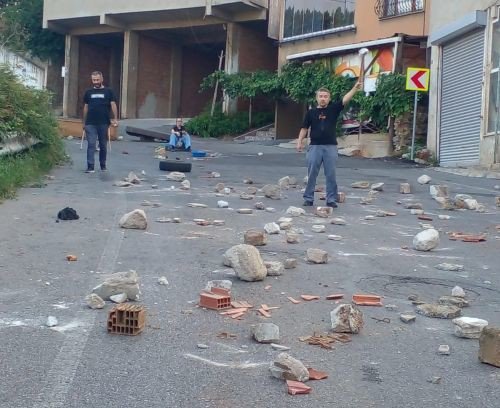
The forced evictions from their homes came with harsh police intervention, Odabaşı mentions. "We couldn't get our things out." "They laid us on the street. A Police raid at 2-3 in the morning? They forcibly entered our houses with rams and emptied them." "For the first time in my life, I saw so many police. I was on the street on July 15, we were on the bridge, I have never seen so many police."
"We had buried our heads in the sand"
Odabaşı, who has supported the government for many years, believes that the regime should definitely change: "If the government does not change after these elections, we have to leave the country, this is not liveable anymore."
"Our parcel gave 80-85 percent of the votes to the government. After that, the mayor (Murat Aydın) told us: 'These are terrorists, they are the members of the six table (the opposition's alliance)'. I voted for the AKP, but we buried our heads in the sand."
Odabaşı had to leave the neighborhood where he lived for 50 years and move to Kavacık, around 10 kilometers away from Tokatköy. He states that many people moved to other districts in this process, while the people who work in the region are double the victim—shopkeepers whose workplaces were destroyed pay higher rents to smaller shops in other areas. (ZK/AS/WM/VK)





.jpg)
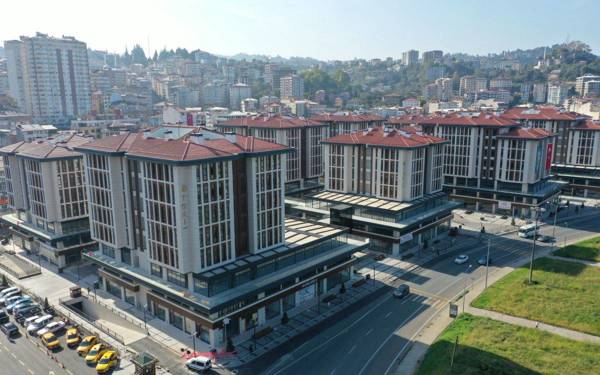
.jpg)
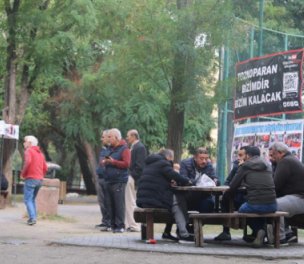
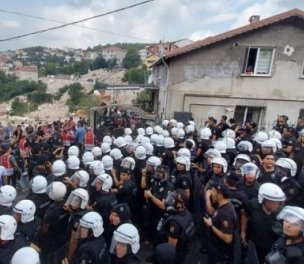
.jpg)
